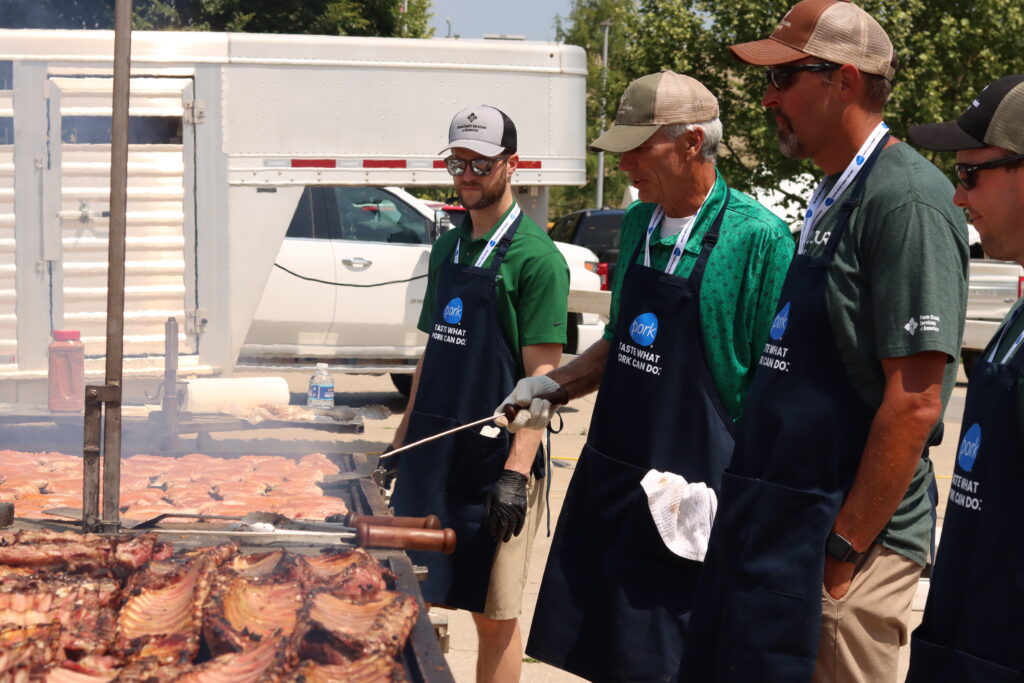## From Hog Heaven to High Hopes: Pork Producers Paint a Rosy Picture at World Pork Expo
The air is thick with the scent of sizzling bacon and the buzz of excitement. It’s the World Pork Expo in Iowa, where the biggest names in pork production gather to share innovations, celebrate successes, and, most importantly, predict a brighter future for the industry.

Trading Tariffs: China’s Impact on U.S. Pork Exports and Potential Opportunities
The ongoing trade war between the U.S. and China has undoubtedly cast a shadow over the U.S. pork industry. China, a major importer of U.S. pork, imposed retaliatory tariffs on American goods, including pork, in April. This resulted in a 172% tariff on U.S. pork entering China. While a 90-day reduction in tariffs was agreed upon in May, leaving a 57% tariff, the uncertainty continues to impact producers.
Despite these challenges, the industry remains optimistic. According to the National Pork Producers Council, the export market constitutes over 25% of U.S. pork production, with a significant portion of U.S. pork variety meats exports directed towards China. Joseph Kerns, a long-term agricultural operations consultant with AgRubicon, advises producers to view this volatility as an opportunity.
“You can either hyperventilate or you can do something,” Kerns said.
He recommends utilizing futures and options contracts to lock in prices while they remain high, effectively mitigating risk and securing profits.
Risk Management: Navigating Market Volatility
Kerns emphasizes that futures and options contracts are powerful marketing tools accessible to all producers, offering a cost-effective way to manage price risk.
“It’s a marketing tool that every producer has at their avail and it is way cheaper than what it should be, in my opinion, and that’s to our advantage,” Kerns stated.
Global Connections: Insights from Kunlong International on the Chinese Market
The World Pork Expo serves as a platform for international connections, showcasing the global reach of the U.S. pork industry. Representatives from Kunlong International, a Chinese livestock equipment company, highlight the continued interest in U.S. pork products despite trade tensions.
Lily Li of Kunlong International reports that approximately 40% of their clientele are based in the United States, and the company anticipates further growth at the expo.
“The tariffs, as of yet, have not caused any changes in the company’s relationship with American customers,” Li explained.
Kunlong International remains optimistic about its partnership with U.S. producers and aims to maintain a stable presence in the market, potentially expanding into other countries.
On the Ground at World Pork Expo: A Sense of Renewed Hope
The atmosphere at the World Pork Expo reflects a palpable shift in producer sentiment. After two years marked by trade wars and low profitability, a sense of optimism pervades the event.
Industry Buzz: Optimism Amidst Challenges
Attendees are cautiously optimistic about the future, acknowledging lingering challenges while recognizing the industry’s resilience and potential for growth.
Iowa’s Pork Powerhouse: A Perspective on the Future of Pork Production
Doug Gruver, an Iowa pork producer from the Sully area, shared his perspective on the evolving landscape of pork production.
“With the future prices the way they are, yes,” Gruver said when asked about his optimism. “But we’ll see what Q4 brings.”
Looking Ahead: Predictions for the 2025 World Pork Expo and the Future of the Industry
Joseph Kerns, who has observed the expo over the years, noted a distinct change in the mood compared to the previous two years.
“This year, we’re going to make money, and you’re going to see more optimism,” Kerns said, anticipating a more buoyant atmosphere at the 2025 expo.
Conclusion
The optimism radiating from the World Pork Expo in Des Moines may be a breath of fresh air for the beleaguered pork industry. As the article highlights, a confluence of factors including stabilizing market prices, easing supply chain pressures, and a renewed focus on sustainability are fueling this sense of hope. Producers are not just weathering the storm, they’re looking ahead with a renewed sense of purpose, ready to navigate the challenges and seize the opportunities that lie ahead.
This shift in sentiment carries significant implications for the future of pork production. It speaks to the industry’s resilience and its ability to adapt to a changing landscape. The focus on sustainability, in particular, is crucial, not just for the industry’s long-term viability but also for its role in feeding a growing global population in an environmentally responsible way. As we move forward, the pork industry’s success will depend on its ability to continue innovating, collaborating, and prioritizing responsible practices.
The future of pork is being written right now, with a renewed sense of optimism and purpose guiding the way. Will this hope translate into tangible progress? Will the industry truly embrace sustainability and deliver on its promise of a better future? Only time will tell, but the seeds of change have been sown, and the potential for a brighter tomorrow is palpable.